Established in 2003, Urological Solutions’ state-of-the-art medical practices – in Adelaide and Darwin – provide advice and treatment for all urological conditions, with particular expertise in urological cancers (prostate, kidney and bladder), robotic surgery, laparoscopic surgery, brachytherapy and laser treatment of both benign prostate enlargement and kidney stones.
Our award-winning team of urological surgeons share many years of practicing medicine in Australia and abroad. We use the latest in urological technologies to ensure the least invasive and best surgical outcomes for our patients.
This includes the use of the latest Da Vinci XI Robot. This robotic system provides a high-definition 3D view for the surgeon and allows all members of the surgical team to view the procedure.

Urological Solutions practices across metropolitan Adelaide and regional South Australian medical centres and hospitals.
We are located as far north as Clare, through the Yorke Peninsula to Adelaide’s north-eastern suburbs and south to Seaford.
We also operate out of Darwin at the Darwin Private Hospital.
Our main practice in Adelaide is at the Tennyson Centre, in Kurralta Park. The Tennyson Centre has additional on-site services including radiology, pathology and a co-located Day Surgery Unit.
We understand the importance of providing comprehensive health care and collaborating with primary care professionals.
It’s why we have a dedicated web page for health professionals with information to help you inform and advise your patients on the best path forward for safe, reliable and effective urological health outcomes. Open communication and shared decision-making are an essential part of providing the best possible care for patients.
At Urological Solutions, we believe keeping primary care professionals involved and informed in treatment and patient progress is a critical component of good health care.


We provide comprehensive and specialised services across all aspects of urological health and care. Our dedicated team of experienced urological surgeons are skilled in using cutting-edge treatments and providing advice on a wide range of conditions, including treatment of prostate cancer and urological malignancies, prostate enlargement, kidney stones, incontinence, erectile dysfunction, vasectomy and vasectomy reversal. We operate across metropolitan Adelaide, Darwin and regional South Australia.
Treatment for Penile and Testicular Conditions
Urological surgeons assess and treat a range of penile and scrotal conditions. Initial assessment typically includes examination in the clinic and review of any ultrasounds. Penile foreskin conditions such as phimosis (tight foreskin) may require circumcision (surgical foreskin removal). Conditions of the internal contents of the scrotum include swelling caused by hydrocoele or varicocoele, or lumps of the testis and epididymis. Corrective surgery for these conditions may be an option depending on individual circumstances. Scrotal conditions are sometimes a sign of problems elsewhere in the urinary tract that may also be assessed.
Brachytherapy
This is the insertion of numerous small radioactive seeds directly into the prostate as a curative option for the treatment of localised prostate cancer. It allows a higher dose of radiation to be delivered directly to the prostate while limiting the dose to surrounding tissue. It is an alternative to other curative options such as surgery or external beam radiotherapy. Suitability for brachytherapy depends upon many factors such as tumour grade, stage, prostate specific antigen, prostate size and symptoms.
Botox
Some patients with an overactive bladder will be candidates for intravesical Botulinum Toxin injection (also known as Botox). This is delivered during a short procedure where a camera is inserted into the bladder and the injections are delivered by a small needle into the muscle of the bladder wall. This procedure needs to be repeated about once a year and carries a small risk of infection and urinary retention, where a patient will need to learn to pass a catheter into their bladder to empty the urine for a short period of time.
Haematuria
Patients who have blood in their urine, both visible and invisible to the naked eye, should be referred to a urologist for investigation. This usually includes a CT scan of their abdomen and pelvis, with contrast (given as an injection into their vein) and a cystoscopy (which is a camera check into the bladder). Common causes of blood in the urine include urinary tract infections and kidney stones, but we do not want to miss a cancer in the bladder or kidney causing blood loss.
Voiding difficulties and Incontinence
Patients with involuntary leakage or loss of urine may have several treatments available for them and would benefit from assessment by a urologist. There are many causes of incontinence, and some are managed by physiotherapy, some require medications, and some require invasive investigations and surgery.
Laser Surgery of Kidney Stones
Stones in the kidney or ureter that are too large to pass naturally will require surgery that ultimately involves the passage of a small camera through the urethra, into the bladder and up the ureter to the stone. At the end of the camera is a small laser fibre which is used to break the stone into tiny fragments. Patients may require a few small operations in order to deal with a single stone and your urologist will discuss this with you individually.
Laporoscopic Surgery
This involves ‘keyhole’ surgery with several small incisions made in the abdomen through which specialised instruments and a camera are placed to perform operations. Procedures are carried out under a general anaesthetic and the abdomen is temporarily inflated with gas (carbon dioxide) to create a working space. Urological surgeons commonly use laparoscopic techniques for operations such as nephrectomy (kidney removal). Advantages over traditional open surgery include shorter hospital stay and faster recovery.
Laser Prostate Surgery
Laser prostate surgery, which includes holmium laser and green light laser treatments, are used to treat men who have voiding difficulties from an enlarged prostate. The laser treatments effectively “re-bore” the prostate to create a larger channel for the urine to pass through. Laser prostate surgeries have some advantages over other enlarged prostate surgical treatments, with less blood loss and earlier removal of catheter post operatively. Laser prostate surgical treatments can also be used to treat enlarged prostates that are very large and maybe suitable for men who are on blood thinning medication for heart conditions.
Peyronie’s / Erectile Dysfunction
Peyronie’s disease is a wound healing process culminating in excess scar formation in the penis, which may cause penile pain, shortening and curvature. It is often accompanied by erectile dysfunction and can result in progressive and severe impairment of penetrative intercourse. Diagnosis of Peyronies Disease requires a physical exam, and possibly an ultrasound to identify and confirm scar tissue. While there is no cure for Peyronie’s disease, it is treatable.
PSA and Prostate Assessment
For men with no symptoms of prostate disease, your GP will be ordering screening PSA blood tests. If the reading is high, we are able to see you at Urological Solutions and evaluate you and your risk of prostate cancer according to the latest national guidelines.
Robotic Surgery
Robotic surgery is a newer form of minimally invasive surgery, or keyhole surgery. It involves the surgeon controlling instruments at a console while a surgical assistant helps with the operation at the bedside. Advantages of robotic surgery include less blood loss, shorter hospital stay, less pain medication and a faster return to work and normal activities. The procedures that utilise robotic surgery in urology include robotic assisted radical prostatectomy (removal of prostate for prostate cancer), robotic assisted radical nephrectomy (removal of the entire kidney for kidney cancer), partial nephrectomy (removal of part of the kidney for kidney cancer) and pyeloplasty (re-plumbing the kidney because of blockage).
Treatment of Urological Cancers: Bladder, Kidney, Prostate & Testes
At Urological Solutions we are proud to offer the full suite of treatments for all cancers including prostate and kidney cancer. Our surgeons are experienced with robotic and laparoscopic surgery, brachytherapy for prostate cancer, as well as having good relationships with medical and radiation oncologists who are experts in their fields.
Urolift and Rezum (for minimally invasive prostate surgery)
There are more options now for treating lower urinary tract symptoms in men than ever before. The transurethral resection of prostate (TURP) remains the gold standard but is not suitable for all patients.
The Urolift device involves inserting an implant which is similar to a staple into the prostate, via the urethra, to push the prostate lobes out of the way and improve urine flow.
The Rezum system uses thermal energy from water vapour to ablate prostate tissue and therefore improve urine flow. Most men will need to have a catheter for a few days after this procedure.
Both these procedures can be done as a day procedure and in some cases can preserve sexual function. Speak to your urologist to discuss Urolift or Rezum.
Vasectomy and Vasectomy Reversal
Vasectomy is an effective, safe and permanent form of contraception for men that can be performed under local or general anaesthesia. It has a low risk of complications and a high success rate for achieving permanent contraception. A vasectomy reversal is surgery to undo a vasectomy. Although vasectomy is considered a permanent form of contraception, advances in microsurgery have improved the success of vasectomy reversal procedures.

How do I make an appointment?
Firstly, you will need an up-to-date referral from your primary treating health professional, usually your GP.
What do I need to bring to my appointment?
You will need your Medicare Card, a health concession card/pension card/or Veteran Gold card – if you are eligible, your private health care details – if you have private health fund insurance, and any scans, x-rays or ultrasounds.
What medical information do I need to provide?
Please provide a list of your current medications, allergies, past medical history and past surgical history. We will provide a form for you to complete at the appointment if this information has not already been provided.
What kind of services do you provide?
We provide comprehensive and specialised services across all aspects of urological health and care. Our dedicated team of experienced urological surgeons is skilled in using cutting-edge treatments and providing advice on a wide range of conditions, including treatment of urological cancers and malignancies, prostate enlargements, kidney stones, incontinence, erectile dysfunction and vasectomy/vasectomy reversal.
When and how is payment required?
Our policy is for full payment of your account on the day of your appointment.
Can I make a Medicare claim without a referral?
Your Medicare claim will not be processed without a valid referral. Please make sure you have a valid referral (make sure it’s not out-dated) and supply your referral to our Reception prior to your appointment.
How do I cancel an appointment?
If you cannot attend an appointment, please let our receptionists know as soon as possible to reschedule. Giving us early notice of at least 24 hours may mean that another patient waiting a long time for an appointment can be called in and seen earlier. Best way to cancel is to call us on (08) 8292 2399 during business hours.
Can I obtain a sick certificate?
Please advise our staff when you present for an appointment if you require a sick certificate. Prior notice is required to prepare your certificate before your consultation.
Where are you located?
In metro Adelaide: Tennyson Centre in Kurralta Park, Flinders Private Hospital in Bedford Park, ICON Cancer Centre (480 specialist centre) in Windsor Gardens, Seaford Day Surgery in Seaford Heights, Hawthorn Specialist Centre in Hawthorn.
In regional SA: Clare Medical Centre in Clare, Wallaroo Hospital in Wallaroo, Yorketown Hospital in Yorketown, and Murray Bridge Clinic in Murray Bridge.
In Darwin: Darwin Private Hospital in Tiwi.

